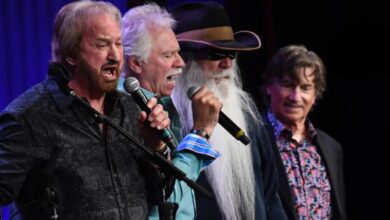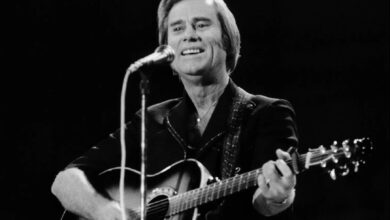The Troggs’ ‘Wild Thing’ Ignites Rock Rebellion in 1966
When Wild Thing burst onto the music scene in 1966, it was unlike anything else on the airwaves. Raw, primal, and bursting with unfiltered energy, the song became an instant hit, propelling The Troggs to international fame. With its simple but unforgettable three-chord structure and Reg Presley’s growling vocals, Wild Thing was an anthem of youthful rebellion. The track soared to the top of the U.S. Billboard Hot 100 and reached No. 2 on the UK Singles Chart, cementing its place as one of the most defining garage rock songs of all time.
The Troggs, a British band from Andover, were originally known as The Troglodytes, a name that hinted at their rough and untamed sound. Led by frontman Reg Presley, the group stood out with their straightforward, almost primitive approach to rock music. While their contemporaries were exploring complex melodies and poetic lyrics, The Troggs embraced a raw, no-frills style that emphasized grit over polish. Presley’s snarling vocal delivery, paired with the band’s driving instrumentation, set them apart in the mid-‘60s British Invasion.
The origins of Wild Thing trace back to an American songwriter named Chip Taylor, the brother of actor Jon Voight. Taylor originally penned the track for The Wild Ones, a lesser-known New York band, but their version failed to make an impact. When The Troggs got their hands on it, they transformed the song into something far more potent. Presley’s raspy, almost sneering vocals, paired with the deliberately simple yet commanding guitar riff, created an undeniable magnetism. The signature ocarina solo—an unusual choice for a rock song—added an unexpected but strangely fitting wildness to the track.
Recorded in just one take at a studio in London, Wild Thing captured an unpolished, almost reckless energy that would later become a hallmark of punk and garage rock. The production, handled by Larry Page, emphasized the song’s raw power rather than refining it. This approach made it stand in stark contrast to the more polished works of The Beatles or The Rolling Stones. Instead of intricate arrangements, The Troggs relied on brute force and simplicity, which, ironically, made the song even more impactful.
Upon its release, Wild Thing quickly became a sensation. The song’s rebellious nature resonated with a generation eager to break free from conventions. In America, it hit No. 1 on the Billboard Hot 100, making The Troggs one of the few British bands to achieve such success. In the UK, it reached No. 2, solidifying its impact on both sides of the Atlantic. The track’s success was not just in sales but in the way it energized rock music, setting the stage for the heavier, grittier sounds that would follow.
The cultural impact of Wild Thing cannot be overstated. It became a defining song of the garage rock movement, inspiring countless bands to pick up guitars and embrace a more aggressive, stripped-down style. The song’s primal energy made it a staple at parties, concerts, and even sporting events, where its anthemic power could be felt by thousands at once. At a time when rock was beginning to take itself more seriously, Wild Thing reminded audiences that music could still be fun, reckless, and exhilarating.
For The Troggs, the success of Wild Thing opened doors to international tours and newfound stardom. They would go on to release other hits such as Love Is All Around and With a Girl Like You, but nothing ever quite matched the seismic impact of Wild Thing. It became their signature song, forever linked to their identity as one of the rawest, most uninhibited bands of the 1960s.
Beyond The Troggs, Wild Thing had a lasting influence on rock music as a whole. It directly inspired the garage rock and proto-punk movements, paving the way for acts like The Stooges, The Ramones, and even punk pioneers The Sex Pistols. Its emphasis on energy over technical precision became a foundational principle for countless underground rock bands.
The song’s infectious simplicity made it a favorite for cover versions, with everyone from Jimi Hendrix to Bruce Springsteen offering their own take. Hendrix’s legendary performance of Wild Thing at the Monterey Pop Festival in 1967, where he set his guitar on fire, remains one of the most iconic moments in rock history. His version injected the song with a psychedelic intensity, proving just how versatile and powerful the track truly was.
At the time of Wild Thing’s release, The Troggs found themselves in the midst of a rapidly evolving music scene. The Beatles were transitioning to more experimental sounds with Revolver, and The Rolling Stones were refining their blues-rock edge. But The Troggs carved out their own lane, bringing back an almost primal energy that appealed to those who craved something raw and unfiltered.
Decades later, Wild Thing remains an undeniable classic. It has been included in numerous “greatest songs of all time” lists and continues to receive airplay, ensuring its legacy lives on. Whether blasting from stadium speakers or being rediscovered by new generations of rock fans, the song’s energy and attitude remain as infectious as ever.
In hindsight, Wild Thing did more than just top the charts—it changed rock music. It stripped the genre down to its essentials, reminding the world that music didn’t need to be complex to be powerful. Its influence stretched far beyond The Troggs, shaping the very DNA of rock and roll and proving that sometimes, the wildest things leave the greatest mark.



